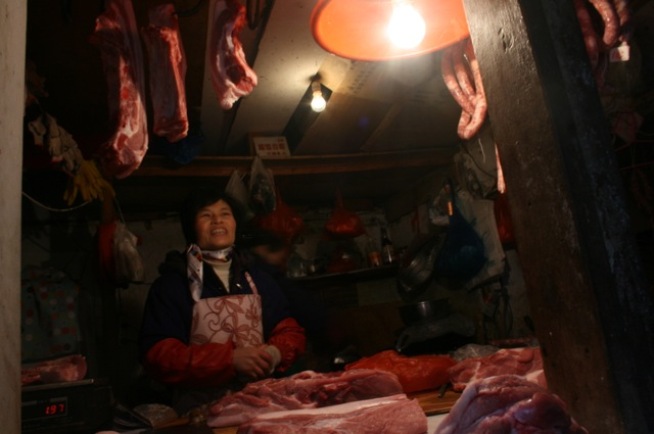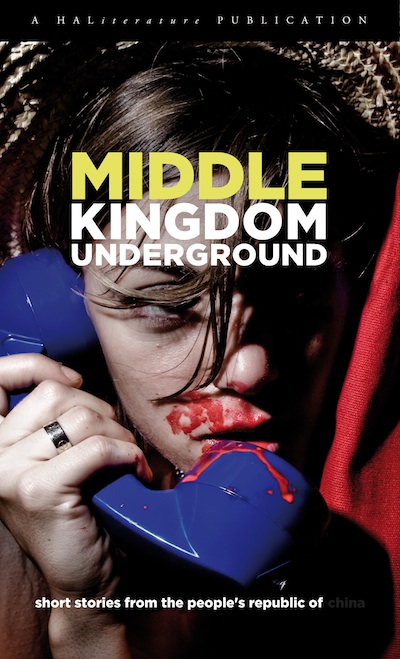Dead Meat
by Lindsay Redifer
For one week, the thick smell of rotten meat in the hot sun walked up and met us in the street. Flies came from everywhere, crawling on our arms and foreheads and deftly avoiding our swats. I don’t think I killed a single one.
All the roads were closed to our little burg. Cam, who had insisted we live in this adorable little shithole, wandered the streets at night, fueled on Tsingdao. He would finish one with a shopkeeper down to his last packages of Tuc crackers and then wander across the street to start again with a manager in a tiny noodle shop.
No, no fancy complex apartment for us, no pool, no gym. Instead, we had a small concrete enclave above a dirt road, laundry lines connecting us to our Chinese neighbors in every direction. Most days it was alright, a truly local neighborhood-but at times like this, oh God. What I wouldn’t give for the oversized dogs and fancy cocktails of the Shanghai elite.
I met Cam just after he’d moved from Ningbo, about three hours outside of the city. He could speak, read and write Chinese without hesitation. He had been to cricket fights, proposed to a tiny, young ayi-in-the-making only to watch her steal his money and run. He’d hung out with several local artists, one of which had been exiled as a youth. Talking to Cam made me dizzy.
I did my best, but not long after Cam and I moved in together on Caobao lu, I found my language skills slipping away. Why bother when your boyfriend translates everything anyway? Soon I was giving over all my transactions, all my questions. It was my backwards slide that had inspired the move to the poorest, most Chinese neighborhood we’d ever seen. And it was right next to Yuyuan Gardens, the ultimate tourist destination in Shanghai.
It took a lot of adjusting. We’d sold most of our more valuable belongings. I had to give up my oven, which I loved, due to lack of space. From my little kitchen window I watched smiling, carefree Chinese women walk arm-in-arm with their foreign men on their way to buy knick knacks or bubble wands. They skipped and giggled while I scrubbed the dishes in freezing cold water.
Soon, we found out why anyone with actual money doesn’t like to live in a neighborhood like ours. The electricity blinked on and off and soon it was off by ten in the morning and didn’t switch on again until six. Our little place had windows in all the wrong places, so natural light was a precious commodity. Cam asked every neighbor what had happened, why the electricity we paid for had disappeared, but all he got was shrugs. “No one cares for us,” our friend Lele said with no emotion. “We’re not important people.”
Then, the blockades. Soon, no delivery trucks could get in. Not that they made much effort. This really boggled us, as all the deliveries that came in were paid for and there had been a good relationship between our local vendors and their suppliers. Again, the explanations had to be dug out of our gravely silent friends and neighbors. Finally, we learned that many of the goods we had bought previously had been expired. Now, it was illegal to sell these and, as we were known to be place to promote this illegal activity, we were being taught a lesson.
“If it’s all they bring us, what can we do?” I was yelling, slapping a towel down on the table. “I can’t stand for this level of bullshit!” In desperation, Cam and I went to other neighborhoods and bought up all the every day sundries we could and filled taxis with our detergents and packaged chicken legs. We tried to set up a little business of our own, only charging enough to get our money back, but we simply couldn’t do enough. We sold out in only a few minutes and found ourselves faced with angry customers demanding we go and get more. Not to mention the surly taxi drivers wanting their share of the money. They had made the delivery, after all.
Finally, with apologies and long explanations, we retired from our positions as shopkeepers. It had been well-intentioned, but what could two stupid foreigners do? “I’ll call some people,” Cam promised me. “I’ve got some guanxi saved up.”
That night Cam and I fell into each others’ arm. The sex sent my panties right out the window. I found them the next morning on the street below us, several wide-eyed young boys standing around them.
Cam did some schmoozing around the city, tried to see who he knew that had a powerful cousin or business associate. I stayed home, cooking and cleaning. The neighbors couldn’t figure out who my ayi was and why they’d never seen her. I kept explaining that I cooked, I cleaned. But, for some reason, this just made them laugh.
He came home empty-handed and depressed. All the whiskey in China couldn’t fill the hearts of uncaring bureaucrats. I went for a long walk to find fresh, bright red steaks that I buried in bok choy so my neighbors wouldn’t see.
The blockades were gone the next morning. Everyone eyed us suspiciously, but we were just as confused as everyone else. Delivery trucks arrived and shelves bowed to their new stock of crackers and sorghum liquor. Who had done this?
That afternoon, a beautiful black car pulled up to our building and a well-dressed, smiling Shanghai princess got out and waved to us like an old friend. We waved back cautiously. What was this?
“Come down, yeah? I need to speak with you!” We walked down our broken steps, stepping carefully. Our white skin had opened some doors for us in the past, but it was usually the chance to sit at a grand banquet or be interviewed on the English-language TV station. We approached the stranger in her perfect outfit and shook her tiny hand.
“Hey, are you busy now? You know, I’m going to lunch at a very nice place on the Bund. I can take you with me?” I started to politely refuse, but was interrupted by my growling stomach. I was starving.
“Oh! I think you need food,” she’d laughed. Her smile looked like a Photoshop set of lips. They didn’t move quite right. “Let’s go!”
Cam and I sat in our cushy seats and held hands. Our host chattered excitedly on her phone, giving us that cut-and-paste smile. We tried to smile back, but for some reason our mouths wouldn’t move. We’re in the coliseum, I thought. Face to face with the lion that’s going to eat us.
I couldn’t help but love the air conditioning on my skin, the fact that it made me shiver just a bit. The leather was sticking to my legs, but it was soft and pleasant. And our hostess smelled amazing. She made me wonder what I smelled like.
Then came lunch and finally, the reason why this woman had sought us out. Apparently, Cam had called attention to a problem that was supposed to go away quietly. No one had counted on two Americans living in this tiny, crumbling place and now they needed us to leave. We were joined by two equally friendly Chinese men just in time for dessert.
“What do you want with these people? They’re not bothering you,” Cam had said, throwing indirectness out with the dirty dishes. This had been met with silence. Cigarette smoke curled into question marks over the table.
“But they are bothering me,” came the response.
The buzzing I’d felt in my head since first seeing this strange woman’s car became louder. “They’re a terrible nuisance, in fact.” She smiled and tilted her head to one side so one of her cohorts could light her cigarette. “They’re living in a place very dear to me. I need to develop it, but first I need them all to leave. Perhaps you could set an example.”
Cam grabbed my hand under the table. All I could think was, Say yes.
She told us everything – her plan to develop a beautiful new hotel for the very best tourists visiting Shanghai, the park that would adjoin it and all the sweet little cafes one could dine at while visiting. In return for our absence, we would get an apartment, rent-free. It would be a pent-house with a cinema and a gym, cool in the summer and warm in the winter.
“So?” She leaned back and waited. How could we say no? We had been offered Heaven without having to repent for any sins, the only cost being our sleepless nights as we faced our consciences.
We made a quick retreat, promising to think it over. We walked back and talked. Cam wasn’t as angry as I’d expected. “It is a hard to place to live,” he admitted. “But, I can’t do that to them. They can’t afford much better. Most of our neighbors grew up in the same apartments they own now. Where will they go?” I sited Photoshop’s promise to give everyone a new, modern place to live, which they had all assured us they wanted, had even asked us to help them pay for many times. Cam nodded and consulted his feet. We both knew the value of a promise in China.
In the end, we moved out secretly. We said no goodbyes and we did not inform Ms. Photoshop of our decision. The only way out of the mess we were in was to disappear. We didn’t pack, assuming our place would be picked apart by all those who had known us. Cam stood looking at our gray, box-like apartment sitting and waiting for us, everything looking like we would be back any second.
“Come on,” I’d said, pulling Cam away. “Our cab is waiting.” Did I imagine it, or did I see some guarded, silent faces watch us leave? Did they feel the same disappointment I felt in myself? Love hadn’t been able to help anyone here. But they would go on as if we had not been, as if our presence had just been an unusual haunting that the right bribe had exorcised. That strength to continue, to press forward, was theirs to keep.




Carefully crafted, wonderful prose.
Simultaneously evocative and clear.